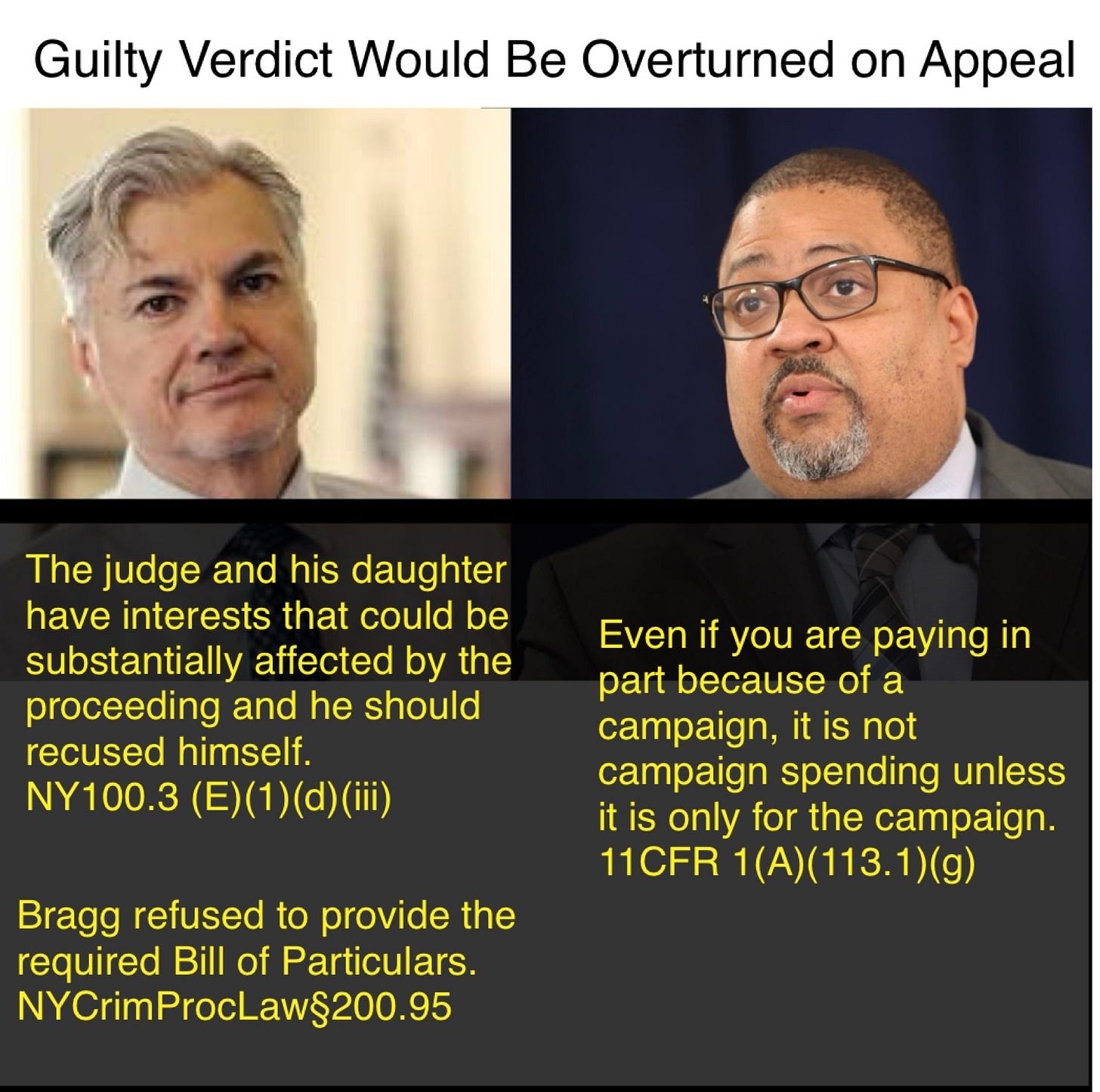Lawfare-Bragg and Judge
Campaign Finance
Even if you are paying in part because of a campaign, it is not campaign spending unless it is only for the campaign. 11CFR 1(A)(113.1) Definitions (g)
Federal Campaign Finance 11CFR 1(A)(113.1) Definitions (g) Personal use means any use of funds in a campaign account of a present or former candidate to fulfill a commitment, obligation or expense of any person that would exist irrespective of the candidate's campaign or duties as a Federal officeholder.
Payments of “hush money”, NDAs or “Catch and Kill” are campaign spending if the only reason is because of the campaign. If there is any other additional reason, such as not embarrassing your wife, protecting your or someone else’s reputation, or any other reason not solely for a campaign, then it is a personal expense and not a campaign expense.
Trump had a wife, a young son, a brand and a reputation. Trump was not expected to win the election.
The fact that extorters tried to leverage an election, does that mean that that was the only reason Trump wanted to pay them for an NDA.
Judge Recusal
The judge and his daughter have interests that could be substantially affected by the proceeding and he should recused himself. NY100.3 (E)(1)(d)(iii)
Merchan is an elected official in an highly partisan district and his reelection would be substantially impacted by the proceedings.
Merchan’s daughter is a major Democratic fundraiser and she would be substantially affected by the proceedings.
The judge so far has refused to recuse himself. This would likely lead to an overturning of a guilty verdict on an appeal.
State of New York Judicial Conduct Section 100.3 (E)(1)(d)(iii) A judge shall disqualify himself in a proceeding in which the judge's impartiality might reasonably be questioned, including but not limited to instances where the judge or a person known by the judge within the sixth degree has an interest that could be substantially affected by the proceeding;
Bill of Particulars
Bragg refused to provide the required Bill of Particulars. NYCrimProcLaw§200.95
N.Y. Crim. Proc. Law § 200.952. Bill of particulars upon request. Upon a timely request for a bill of particulars by a defendant against whom an indictment is pending, the prosecutor shall within fifteen days of the service of the request or as soon thereafter as is practicable, serve upon the defendant or his attorney, and file with the court, the bill of particulars, except to the extent the prosecutor shall have refused to comply with the request pursuant to subdivision four of this section.
The prosecutor may refuse to comply with the request for a bill of particulars or any portion of the request for a bill of particulars to the extent he reasonably believes that the item of factual information requested is not authorized to be included in a bill of particulars, or that such information is not necessary to enable the defendant adequately to prepare or conduct his defense, or that a protective order would be warranted or that the demand is untimely.
The Charge
NY § 175.10 Falsifying business records in the first degree. A person is guilty of falsifying business records in the first degree when he commits NY § 175.05 the crime of falsifying business records in the second degree , and when his intent to defraud includes an intent to commit another crime or to aid or conceal the commission thereof. Falsifying business records in the first degree is a class E felony.
The Other Crime
NY § 17-152 Conspiracy to promote or prevent election
Any two or more persons who conspire to promote or prevent the election of any person to a public office by unlawful means and which conspiracy is acted upon by one or more of the parties thereto, shall be guilty of a misdemeanor.
§ 175.05 Falsifying business records in the second degree.
A person is guilty of falsifying business records in the second degree
when, with intent to defraud, he:
1. Makes or causes a false entry in the business records of an
enterprise; or
2. Alters, erases, obliterates, deletes, removes or destroys a true
entry in the business records of an enterprise; or
3. Omits to make a true entry in the business records of an enterprise
in violation of a duty to do so which he knows to be imposed upon him by
law or by the nature of his position; or
4. Prevents the making of a true entry or causes the omission thereof
in the business records of an enterprise.
Falsifying business records in the second degree is a class A
misdemeanor.
https://www.nationalreview.com/2024/05/trump-should-be-acquitted-in-manhattan
https://x.com/optimistcskeptc/status/1784049759721759215?s=46&t=Y4fVsDnz2q8uZ3VNKeco4A



